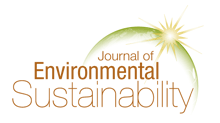Creative Commons License

This work is licensed under a Creative Commons Attribution 4.0 International License.
Abstract
Jordan, as other developing countries in the world, is struggled by instable agricultural development due to existing various water pressures (e.g. increase in irrigation demands, deterioration of water quality, industrial pollution, water borne sewerage, etc.), climate change impacts, and biophysical and socioeconomic barriers (e.g. rapid population growth, social unsettlements, sudden refuges and migrations, limited economic resources, low levels of technology, environmental limitations and stresses, and widespread poverty). One of the adaptive key issues for the Jordanian environmental sustainable development is the awareness of farmers on the water savings and environmental protections at farm level. The aim of this study was to present a descriptive analysis for the adopted conventional farming practices at the Jordan Valley and explore potential of adoption of new technologies in agricultural management coupled with sustainable environmental performances, as pursued by the project “Improving the Environmental Sustainability of Irrigated Agricultural Production in Lebanon and Jordan (ENSIAP)”. Twenty farmers were selected to represent the heterogeneity of the farming practices along the three zones (districts) of Jordan Valley: Northern, Middle, and Southern Jordan Valley. A detailed survey questionnaire was developed to investigate for the potential improvements in the conventional and the newly introduced farming practices to ensure the sustainability of all natural resources. The heterogeneity of the farmers' knowledge, experience, and capabilities were determined in addition to various components of cropping/ farming practices. Seven themes were emphasized in this study including (1) Farm characteristics, (2) Soil description and management, (3) Crop characteristics and management, (4) Water Irrigation parameters, (5) Cultivation and fertilizer use, (6) Environmental related issues, and (7) Farmer experience. Results indicated that most of the farmers are not fully aware with environmental sustainability issues. The irrigation systems, fertilizer use, and management practices currently in use are not resource-conservative and do not follow Best Agricultural and Management Practices, leading to high soil and groundwater degradation and pollution.
Recommended Citation
Al-Qinna, Mohammed I. Dr. and Salahat, Mohammed Ali Dr.
(2017)
"Investigating Agricultural Management Practices and Environmental Sustainability in Jordan,"
Journal of Environmental Sustainability: Vol. 5:
Iss.
1, Article 1.
Available at:
https://repository.rit.edu/jes/vol5/iss1/1
